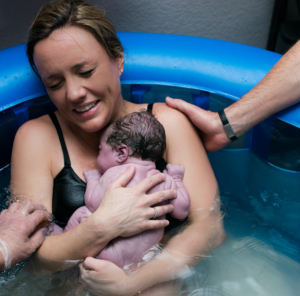Thinking of Using a Midwife for your Birth?
By Janet Schwab
Giving birth is filled with many decisions and questions, starting with where and with whom you will give birth. In the past 100 years most babies were primarily delivered by general practitioners, and more recently obstetrician specialists. In the 1970s, nurse midwives initially cared for those who were poor. However, as the second wave feminist movement took hold, more affluent women began seeking midwifery care. Their ability to pay for this care as an alternative to mainstream medicine opened the door to midwifery practice for all women.

Thoughts about conventional evidence-based medical practices are ever-changing, impacting many women’s decisions about childbirth out of a desire for greater autonomy and control over their pregnancies and birth experiences. Whether you choose in-hospital birth or birth outside of a hospital, there are some important questions to consider and ask.
In-Hospital Birth:
Start by asking questions about the hospital’s policies, such as whether eating and drinking are permitted during labor; if continuous electronic fetal monitoring is required for women with normal pregnancies and labors; if there is a tub for mom to soak in for pain relief or water birth; if delayed cord clamping is routinely practiced; whether policies are in place that promote keeping baby and mom together in the first hour after birth, including delaying routine newborn procedures; the rate of c-section for midwives and doctors; if an epidural will be available for pain relief and if an anesthetist is assigned to the labor and birth unit.
Birth Outside of a Hospital:
Make sure you ask if the midwife has ever had a baby or mom die during or after delivery; how the baby’s wellbeing is monitored during labor; what might lead the midwife to transfer you to the hospital during labor or after giving birth; what might be a cause for transferring the baby to a hospital, and which hospital would be selected; whether the midwife has any collegial relationships with hospitals, doctors, or midwives who practice in a hospital; what happens if your pregnancy goes beyond your due date; and what if your bag of waters breaks prior to labor beginning.
Often, women and their partners are all one or the other when deciding on a plan, choosing a “natural” birth or a repeat c-section. As a result, when something changes, they are reluctant to adjust that plan. It is important to choose your provider carefully and know that you are free to change your mind. Be sure to communicate your plan with your provider and discuss what happens if your circumstances or thoughts change. As always, the physical and psychological safety of mother and newborn are paramount.
Janet Schwab, MSN, CNM is a Certified Nurse Midwife with many years of experience. She is founder of Besholem midwifery services, which promotes safe birth through positive prenatal care focused on individual need, nutritional counseling, childbirth education, and a qualified birth attendant with access to physician consultation, hospital referral, and postnatal follow-up of mother and baby. Call her at 716-245-5425 or email her at schwab.janet@gmail.com. Visit her website at www.besholemmidwiferyandwomenshealthcareservices.com.












